The UNA Resources, Local Updates and Newsletter Blog
Stop trying to find information all over the web. Start below with a simple access to read the blog’s United Nurse of Alberta (UNA) resources, UNA Local 115 updates and our newsletter so you can be informed!
Catagories:
Local | Newsletters | UNA
Archive
- April 2025
- March 2025
- January 2025
- December 2024
- November 2024
- October 2024
- July 2024
- May 2024
- April 2024
- March 2024
- February 2024
- January 2024
- December 2023
- November 2023
- October 2023
- September 2023
- August 2023
- June 2023
- May 2023
- April 2023
- March 2023
- February 2023
- November 2022
- August 2022
- June 2022
- May 2022
- April 2022
- March 2022
- January 2022
- November 2021
- October 2021
- September 2021
- June 2021
- May 2021
- March 2021
- February 2021
- January 2021
- August 2020
- June 2020
- May 2020
- April 2020
- March 2020
- December 2019
- October 2019
- September 2019
- July 2019
- April 2019
- February 2019
- January 2019
- December 2018
- November 2018
- October 2018
- August 2018
- November 2017
- June 2017
- April 2017
- January 2017
- September 2016
- April 2016
- December 2015
- October 2015
- May 2015
- March 2015
- January 2015
- November 2014
- September 2014
- June 2014
- April 2014
- September 2013
- June 2013
- April 2013
- February 2013
- October 2012
- April 2012
- February 2012
- November 2011
- October 2011
- September 2011
- March 2011
- February 2011
- December 2010
- August 2010
- April 2010
- February 2010
- December 2009
- October 2009
- August 2009
- June 2009
- May 2009
- August 2008
- January 2008
- December 2007
- July 2007
- May 2007
- April 2007
- March 2007
- February 2007
- January 2007
- December 2006
- November 2006
- October 2006
- September 2006
- August 2006
- July 2006
- June 2006
- May 2006
- April 2006
- March 2006
- February 2006
- January 2006
- December 2005
- November 2005
- October 2005
- September 2005
- August 2005
- July 2005
- June 2005
- May 2005
- April 2005
- March 2005
- February 2005
- January 2005
- December 2004
- November 2004
- October 2004
- September 2004
- June 2004
- May 2004
- April 2004
- February 2004
- January 2004
- December 2003
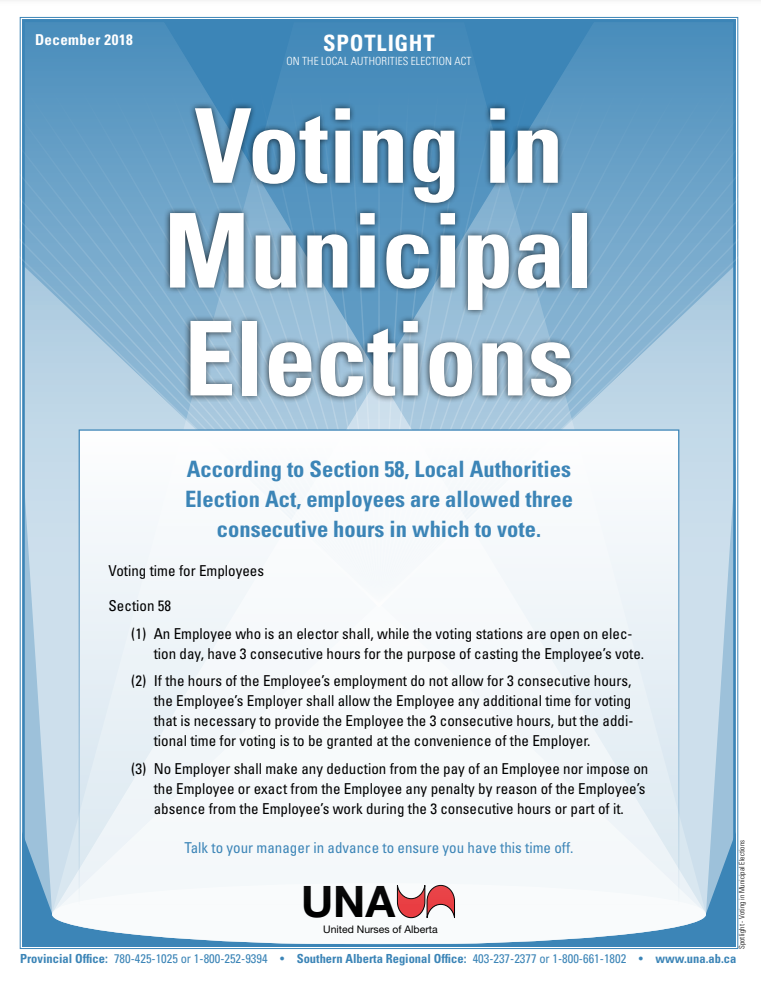
Voting in Municipal Elections
Voting in Municipal Elections
According to Section 58, Local Authorities Election Act, employees are allowed three consecutive hours in which to vote. Voting time for Employees Section 58 (1) An Employee who is an elector shall, while the voting stations are open on election day, have 3 consecutive hours for the purpose of casting the Employee’s vote. (2) If the hours of the Employee’s employment do not allow for 3 consecutive hours, the Employee’s Employer shall allow the Employee any additional time for voting that is necessary to provide the Employee the 3 consecutive hours, but the additional time for voting is to be granted at the convenience of the Employer. (3) No Employer shall make any deduction from the pay of an Employee nor impose on the Employee or exact from the Employee any penalty by reason of the Employee’s absence from the Employee’s work during the 3 consecutive hours or part of it. Talk to your manager in advance to ensure you have this time off.

Casual Employees not required to work a minimum number of shifts
Casual Employees not required to work a minimum number of shifts
An Employer cannot impose the requirement that casual Employees must be available to work a minimum number of shifts, in order to remain on the Casual List. Under the UNA Provincial Collective Agreement there is no provision for requiring Casuals to work a certain number of shifts. Article 30.03 a) i) of the Agreement states: “No Casual Employee shall be scheduled except with the Employee’s consent.” Please note, however, that Casual Employees must keep updated on certifications and communications in the area in which they work. Contact your UNA local executive or your Labour Relations Officer if any Employer is attempting to require a casual employee to work any shift
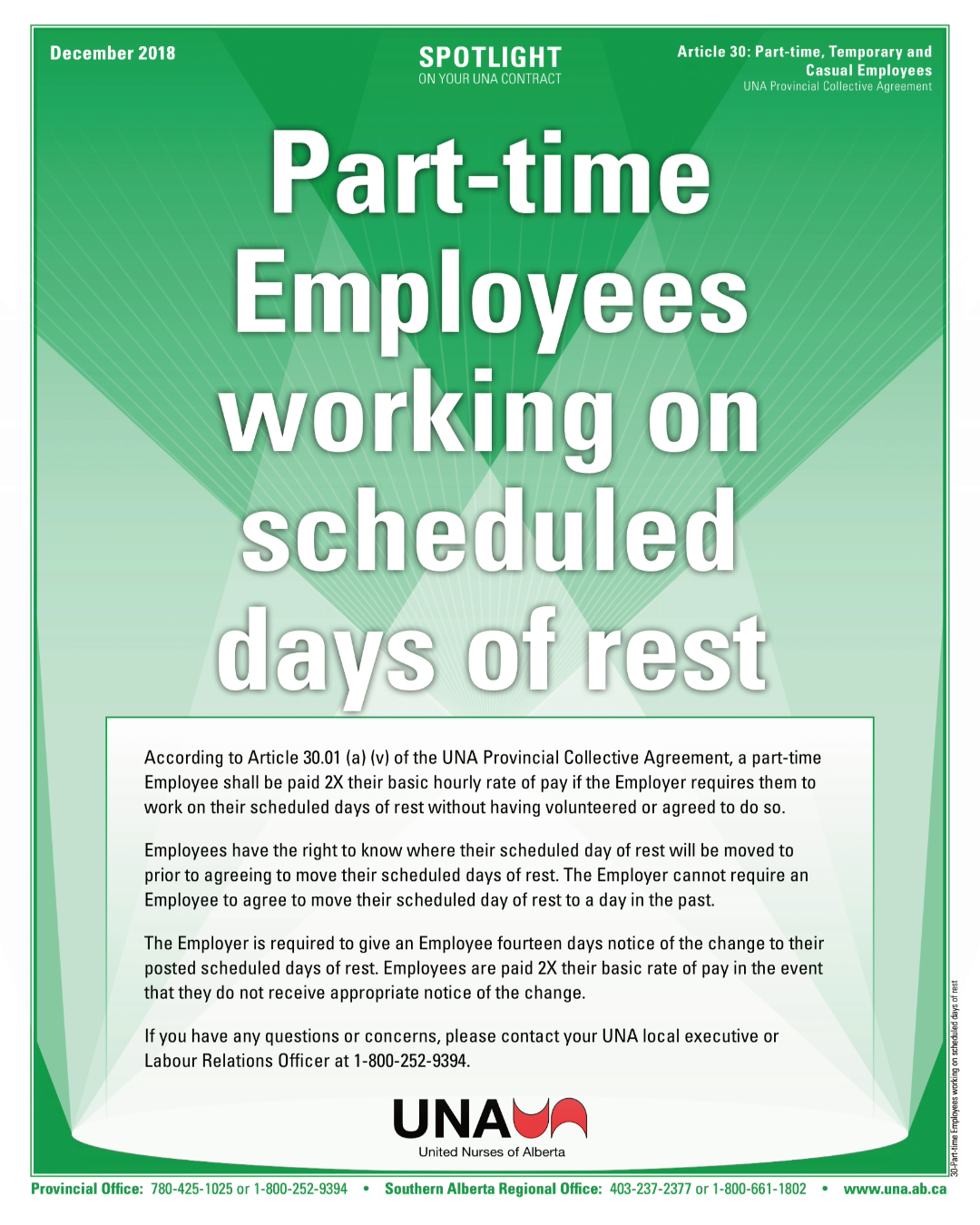
Part-time Employees working on scheduled days of rest
Part-time Employees working on scheduled days of rest
According to Article 30.01 (a) (v) of the UNA Provincial Collective Agreement, a part-time Employee shall be paid 2X their basic hourly rate of pay if the Employer requires them to work on their scheduled days of rest without having volunteered or agreed to do so. Employees have the right to know where their scheduled day of rest will be moved to prior to agreeing to move their scheduled days of rest. The Employer cannot require an Employee to agree to move their scheduled day of rest to a day in the past. The Employer is required to give an Employee fourteen days notice of the change to their posted scheduled days of rest. Employees are paid 2X their basic rate of pay in the event that they do not receive appropriate notice of the change. If you have any questions or concerns, please contact your UNA local executive or Labour Relations Officer at 1-800-252-9394.

Appealing denied drug benefit claims
Appealing denied drug benefit claims
The UNA Provincial Collective Agreement ensures coverage for all prescribed medication. Article 21.01(a)(ii) of the collective agreement states: (a) (ii) 80% direct payment provision for all medication prescribed by a qualified practitioner. Subject to continuation of Joint Appeal Panel criteria that medication must be: (A) prescribed by a physician, dentist, pharmacist or nurse practitioner to correct or treat a medical condition: that is (B) based on a diagnosis made by a physician, dentist or nurse practitioner; and (C) which is required to be consumed (orally, by injection, absorbed or inhaled); and is (D) dispensed by a pharmacist. Employees who have had a prescription claim denied should contact their UNA local executive or Labour Relations Officer.

Protect your rights after an extended absence
Protect your rights after an extended absence
United Nurses of Alberta must be consulted in all cases of return to work and duty to accommodate Employees returning to work after an extended absence have the right to Union representation. For Employees who have medical restrictions on the work they can do and are being accommodated in a position that matches their abilities, UNA must be involved to ensure fair and safe treatment. UNA collective agreements require Union consultation in returning to work after a LongTerm Disability or Workers’ Compensation absence. If you are coming back after an extended absence, contact your UNA local executive or Labour Relations Officer to ensure union representation in the process. 19.07 (a) (iii) In reinstating an Employee under (ii), the Employer will consult with the Employee and the Union over possible suitable placements and reinstate the Employee to a site suitable to the Employee if possible. If that is not possible, the Employee will be reinstated to their home site if possible. If the foregoing options are not possible, the Employee will be reinstated to the closest possible site to that Employee’s home site.

28 Days Notice before returning to work after long-term disability
28 Days Notice before returning to work after long-term disability
Employees receiving long-term disability benefits and are incapable of performing the duties of thier previous position must provide their Employer with 28 days notice when preparing to return to work. According to Article 19.07 (a) (ii) of the UNA Provincial Collective Agreement, an Employee shall provide the Employer with 28 days written notice of the Employee’s readiness to return to work. The Employer shall reinstate the Employee to an existing position if the Employee is capable of performing the work entailed. This position will not be less than the same step in the pay scale and other benefits that accrued to the Employee prior to disability. If you have any questions or concerns, please contact your UNA local executive or Labour Relations Officer at 1-800-252-9394.
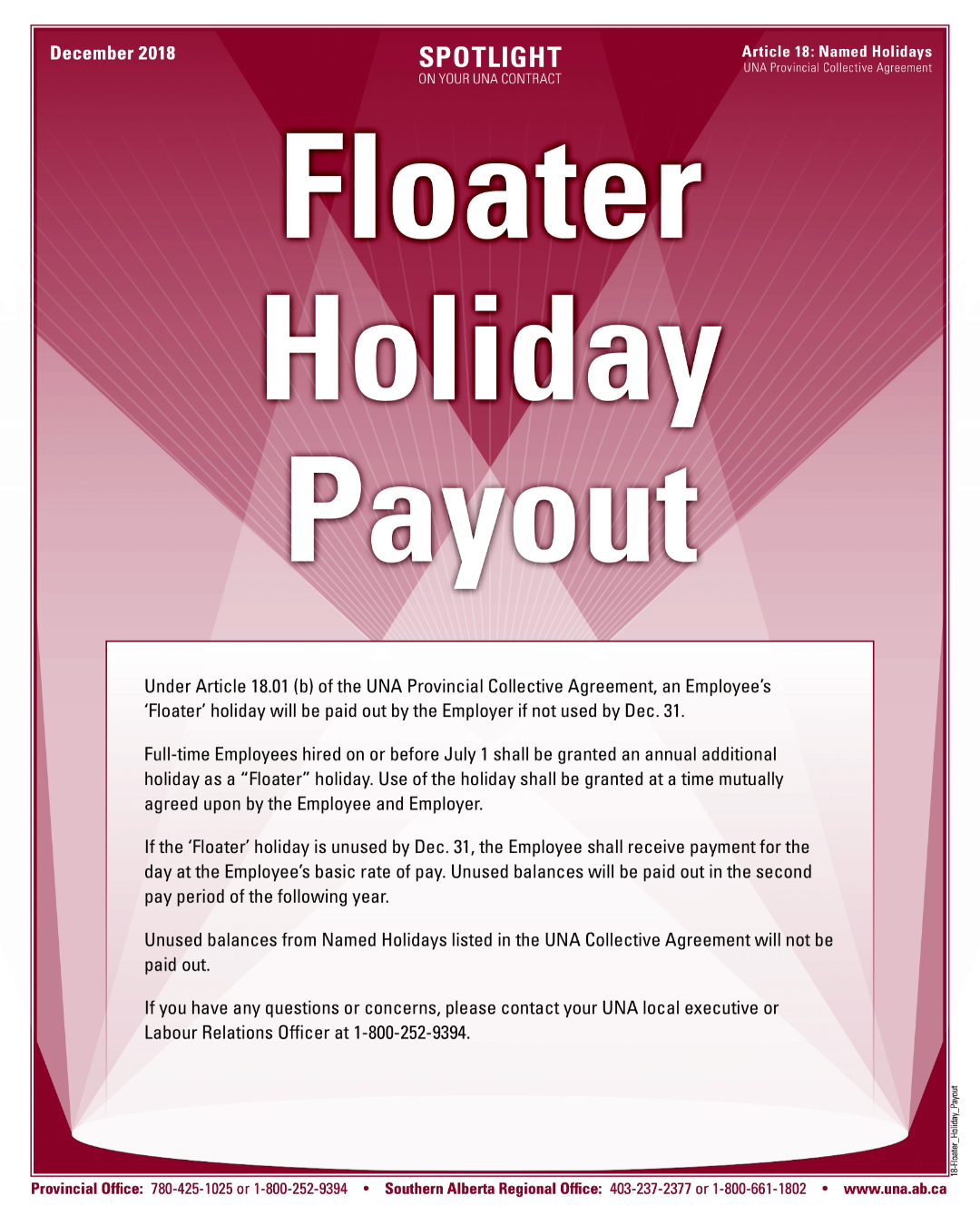
Floater Holiday Payout
Floater Holiday Payout
Under Article 18.01 (b) of the UNA Provincial Collective Agreement, an Employee’s ‘Floater’ holiday will be paid out by the Employer if not used by Dec. 31. Full-time Employees hired on or before July 1 shall be granted an annual additional holiday as a “Floater” holiday. Use of the holiday shall be granted at a time mutually agreed upon by the Employee and Employer. If the ‘Floater’ holiday is unused by Dec. 31, the Employee shall receive payment for the day at the Employee’s basic rate of pay. Unused balances will be paid out in the second pay period of the following year. Unused balances from Named Holidays listed in the UNA Collective Agreement will not be paid out. If you have any questions or concerns, please contact your UNA local executive or Labour Relations Officer at 1-800-252-9394.
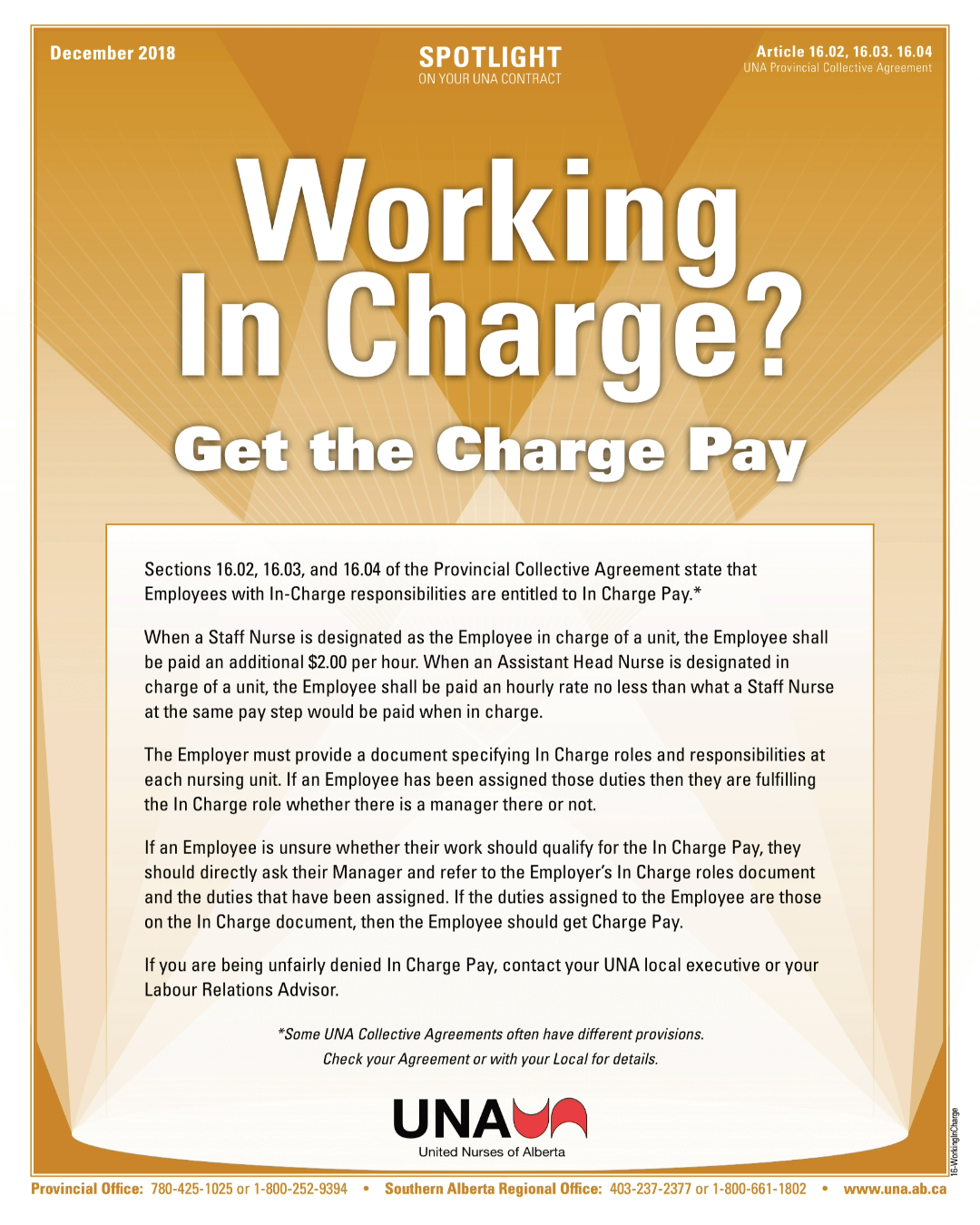
Working In Charge?
Working In Charge?
Sections 16.02, 16.03, and 16.04 of the Provincial Collective Agreement state that Employees with In-Charge responsibilities are entitled to In Charge Pay.* When a Staff Nurse is designated as the Employee in charge of a unit, the Employee shall be paid an additional $2.00 per hour. When an Assistant Head Nurse is designated in charge of a unit, the Employee shall be paid an hourly rate no less than what a Staff Nurse at the same pay step would be paid when in charge. The Employer must provide a document specifying In Charge roles and responsibilities at each nursing unit. If an Employee has been assigned those duties then they are fulfilling the In Charge role whether there is a manager there or not. If an Employee is unsure whether their work should qualify for the In Charge Pay, they should directly ask their Manager and refer to the Employer’s In Charge roles document and the duties that have been assigned. If the duties assigned to the Employee are those on the In Charge document, then the Employee should get Charge Pay. If you are being unfairly denied In Charge Pay, contact your UNA local executive or your Labour Relations Advisor. *Some UNA Collective Agreements often have different provisions. Check your Agreement or with your Local for details.
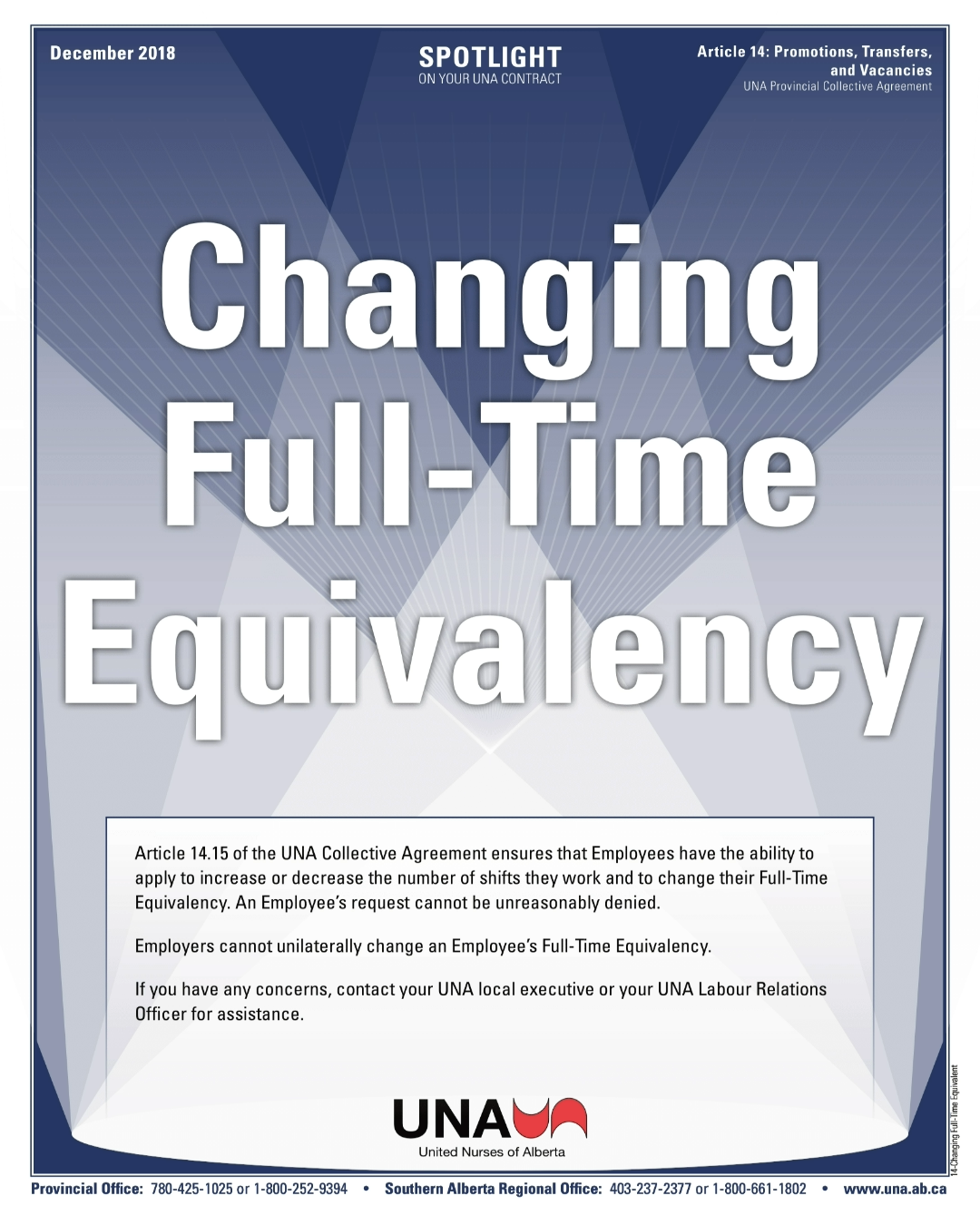
Changing Full-Time Equivalent
Changing Full-Time Equivalent
Article 14.15 of the UNA Collective Agreement ensures that Employees have the ability to apply to increase or decrease the number of shifts they work and to change their Full-Time Equivalency. An Employee’s request cannot be unreasonably denied. Employers cannot unilaterally change an Employee’s Full-Time Equivalency. If you have any concerns, contact your UNA local executive or your UNA Labour Relations Officer for assistance.

Paying out Overtime hours
Paying out Overtime hours
According to Article 8.01 (c) of the United Nurses of Alberta Provincial Collective Agreement, time off not taken by March 31 in any given year shall be paid out unless otherwise mutually agreed. If an Employee formally requests to carry over accumulated overtime hours, the Employer cannot unreasonably deny that request. Example: If an Employee can demonstrate that they have attempted to take Time Off in Lieu (TOIL) using overtime hours, but had their request denied, the Employer cannot deny a request to carry over those hours into the next year. Notwithstanding the Collective Agreement, the Employment Standards Code prohibits the Employer from unilateral payout of banked overtime earned within the previous six months. If you have such overtime paid out, please contact UNA. If you have any questions or concerns, please contact your UNA Local Executive or Labour Relations Officer at 1-800-252-9394.
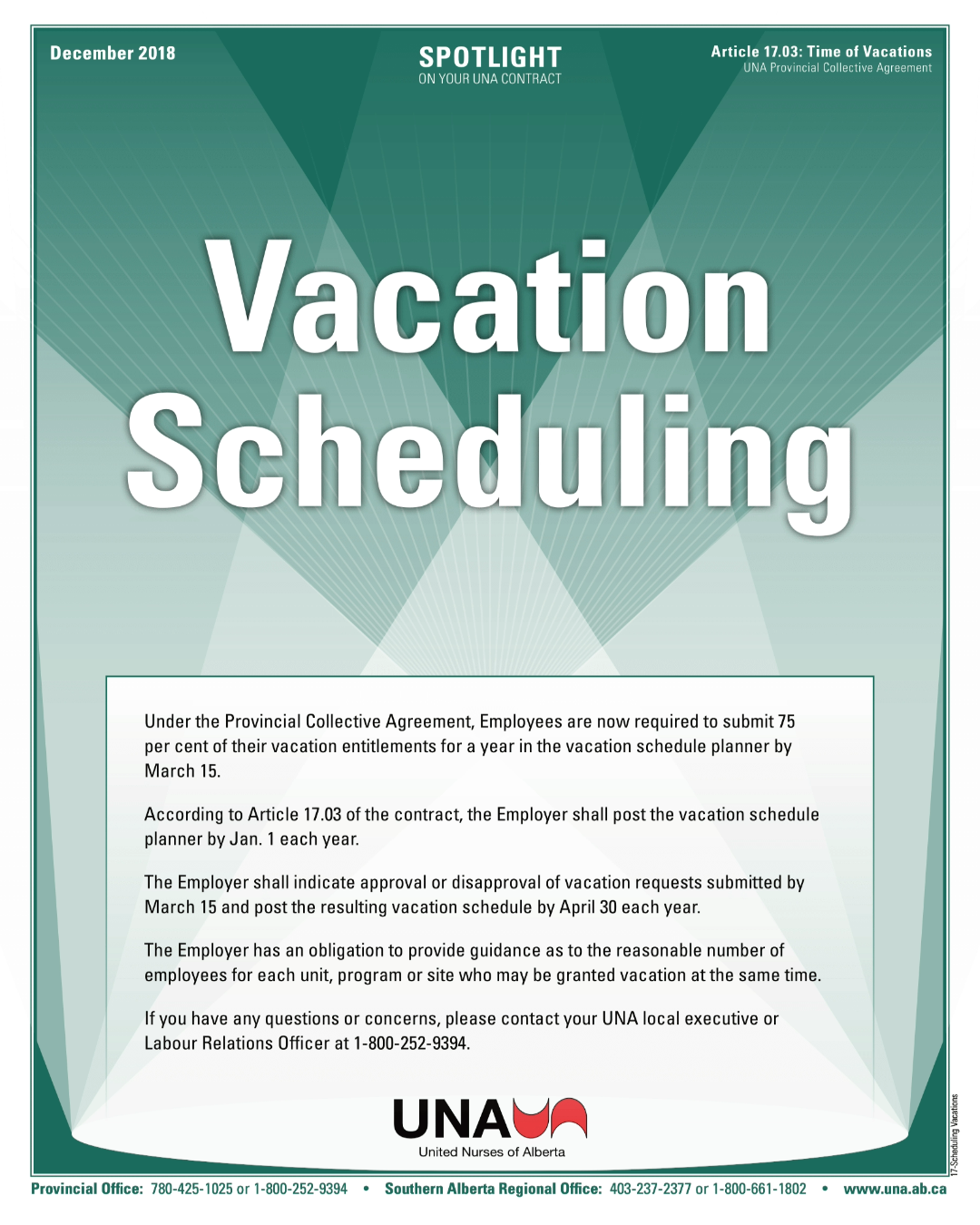
Scheduling Vacations
Scheduling Vacations
Under the Provincial Collective Agreement, Employees are now required to submit 75 per cent of their vacation entitlements for a year in the vacation schedule planner by March 15. According to Article 17.03 of the contract, the Employer shall post the vacation schedule planner by Jan. 1 each year. The Employer shall indicate approval or disapproval of vacation requests submitted by March 15 and post the resulting vacation schedule by April 30 each year. The Employer has an obligation to provide guidance as to the reasonable number of employees for each unit, program or site who may be granted vacation at the same time. If you have any questions or concerns, please contact your UNA local executive or Labour Relations Officer at 1-800-252-9394.
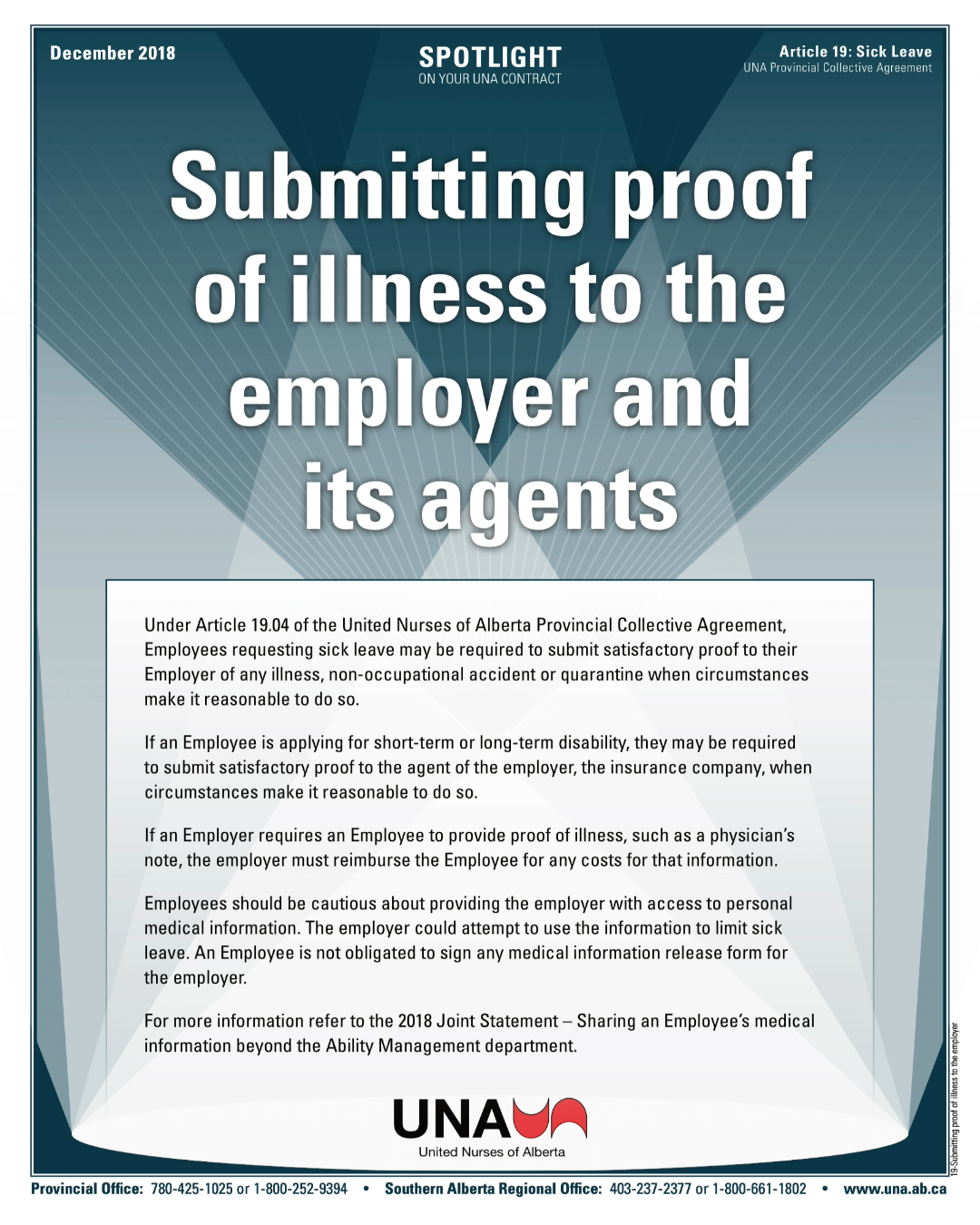
Submitting proof of illness to the employer
Submitting proof of illness to the employer
Under Article 19.04 of the United Nurses of Alberta Provincial Collective Agreement, Employees requesting sick leave may be required to submit satisfactory proof to their Employer of any illness, non-occupational accident or quarantine when circumstances make it reasonable to do so. If an Employee is applying for short-term or long-term disability, they may be required to submit satisfactory proof to the agent of the employer, the insurance company, when circumstances make it reasonable to do so. If an Employer requires an Employee to provide proof of illness, such as a physician’s note, the employer must reimburse the Employee for any costs for that information. Employees should be cautious about providing the employer with access to personal medical information. The employer could attempt to use the information to limit sick leave. An Employee is not obligated to sign any medical information release form for the employer. For more information refer to the 2018 Joint Statement – Sharing an Employee’s medical information beyond the Ability Management department.
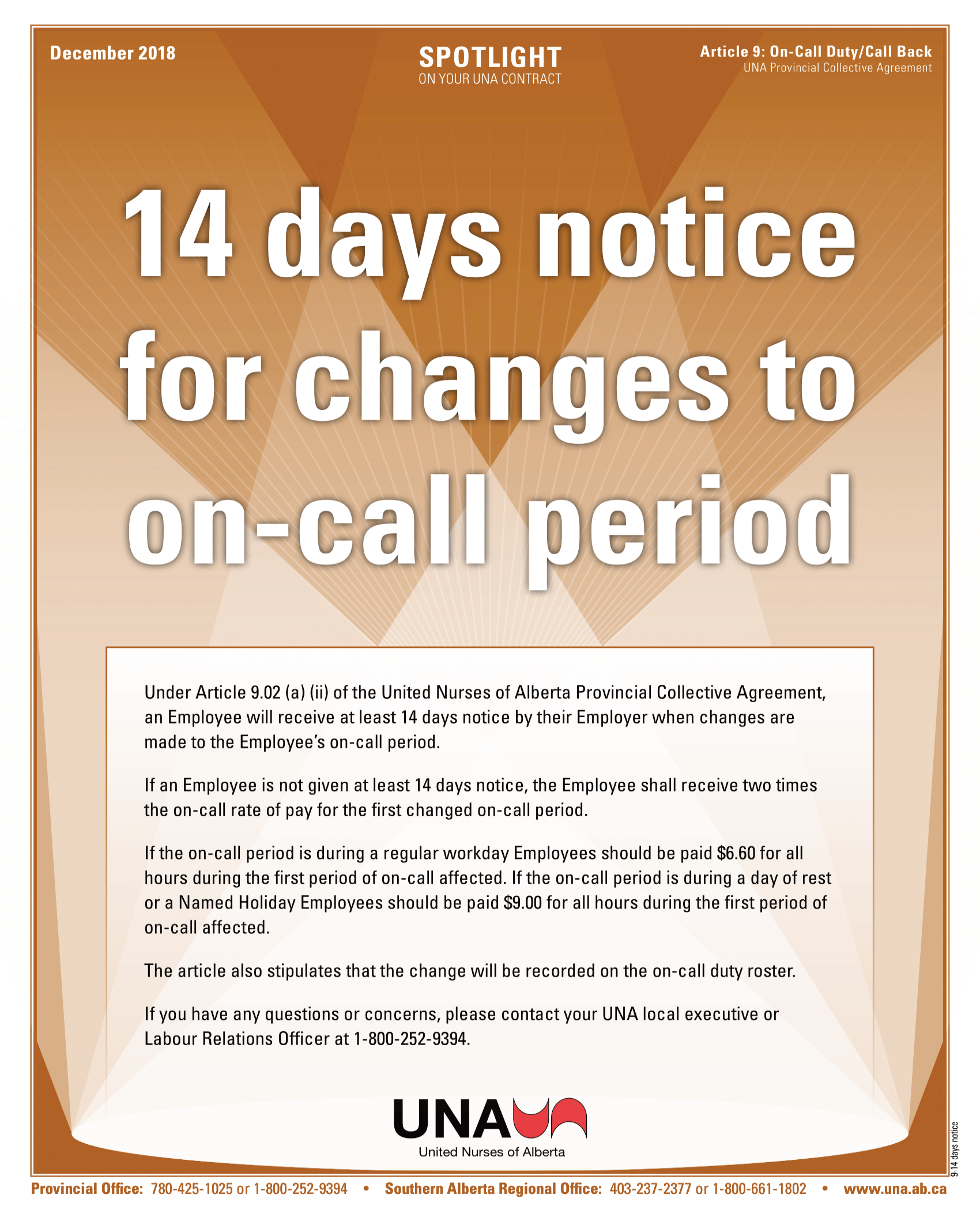
14 days notice for changes to on-call period
14 days notice for changes to on-call period
Under Article 9.02 (a) (ii) of the United Nurses of Alberta Provincial Collective Agreement, an Employee will receive at least 14 days notice by their Employer when changes are made to the Employee’s on-call period. If an Employee is not given at least 14 days notice, the Employee shall receive two times the on-call rate of pay for the first changed on-call period. If the on-call period is during a regular workday Employees should be paid $6.60 for all hours during the first period of on-call affected. If the on-call period is during a day of rest or a Named Holiday Employees should be paid $9.00 for all hours during the first period of on-call affected. The article also stipulates that the change will be recorded on the on-call duty roster. If you have any questions or concerns, please contact your UNA local executive or Labour Relations Officer at 1-800-252-9394.

Duty during meal breaks requires notice and proper pay
Duty during meal breaks requires notice and proper pay
Situations often develop in UNA workplaces in which nurses are required to be available to work during their scheduled meal breaks, which means they are unable to leave the building during their meal breaks. Meal breaks are normally not counted when the Employee’s hours of work are calculated. Under UNA’s Provincial Collective Agreement, an Employer is permitted to make such a demand – with two important conditions. The Employee must be advised in advance of the requirement to be available, and the Employees must be paid for meal periods when they have received such a notification and are therefore unable to leave the building. They must receive this pay even if they are not called to work. The relevant Article in the Collective Agreement is 7.01 (c), which states: Although meal periods are excluded in the calculation of regular hours of work, Employees required to be readily available for duty during their meal period shall be so advised in advance and paid for those meal periods at their Basic Rate of Pay. For more information, contact your UNA local executive or your UNA Labour Relations Officer at 1-800-252-9394.

Overtime for compulsory in-services on designated days of rest
Overtime for compulsory in-services on designated days of rest
Employees who are required to attend a compulsory in-service session on any day they are not regularly scheduled to work must be paid at the overtime rate of 2X their regular salary. Under Article 35.02 (a) of the UNA Provincial Collective Agreement, Employees can be required to attend compulsory in-services on days they are not normally working. Because the sessions are compulsory, it is the equivalent of mandatory overtime, and must be paid at the overtime rate. UNA has won two arbitrations on this topic. Employees who are offered choices of attending a compulsory in-service on a day they are normally working cannot choose instead to attend on a non-working day, in order to get the overtime rate. In the case of any dispute about the correct rate to be paid for attending a compulsory inservice, check immediately with your UNA local executive or Labour Relations Officer.
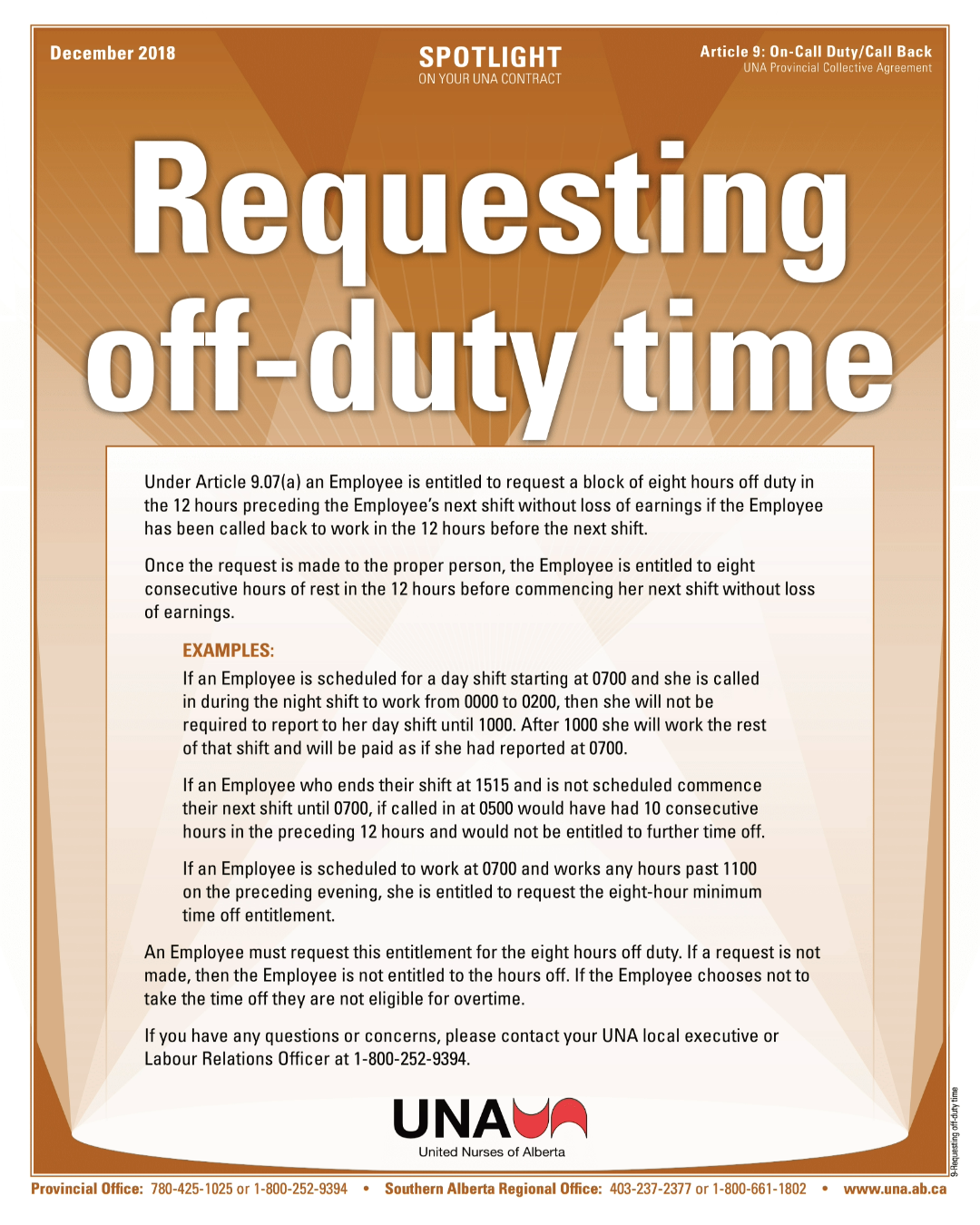
Requesting off-duty time
Requesting off-duty time
Under Article 9.07(a) an Employee is entitled to request a block of eight hours off duty in the 12 hours preceding the Employee’s next shift without loss of earnings if the Employee has been called back to work in the 12 hours before the next shift. Once the request is made to the proper person, the Employee is entitled to eight consecutive hours of rest in the 12 hours before commencing her next shift without loss of earnings. EXAMPLES: If an Employee is scheduled for a day shift starting at 0700 and she is called in during the night shift to work from 0000 to 0200, then she will not be required to report to her day shift until 1000. After 1000 she will work the rest of that shift and will be paid as if she had reported at 0700. If an Employee who ends their shift at 1515 and is not scheduled commence their next shift until 0700, if called in at 0500 would have had 10 consecutive hours in the preceding 12 hours and would not be entitled to further time off. If an Employee is scheduled to work at 0700 and works any hours past 1100 on the preceding evening, she is entitled to request the eight-hour minimum time off entitlement. An Employee must request this entitlement for the eight hours off duty. If a request is not made, then the Employee is not entitled to the hours off. If the Employee chooses not to take the time off they are not eligible for overtime. If you have any questions or concerns, please contact your UNA local executive or Labour Relations Officer at 1-800-252-9394.
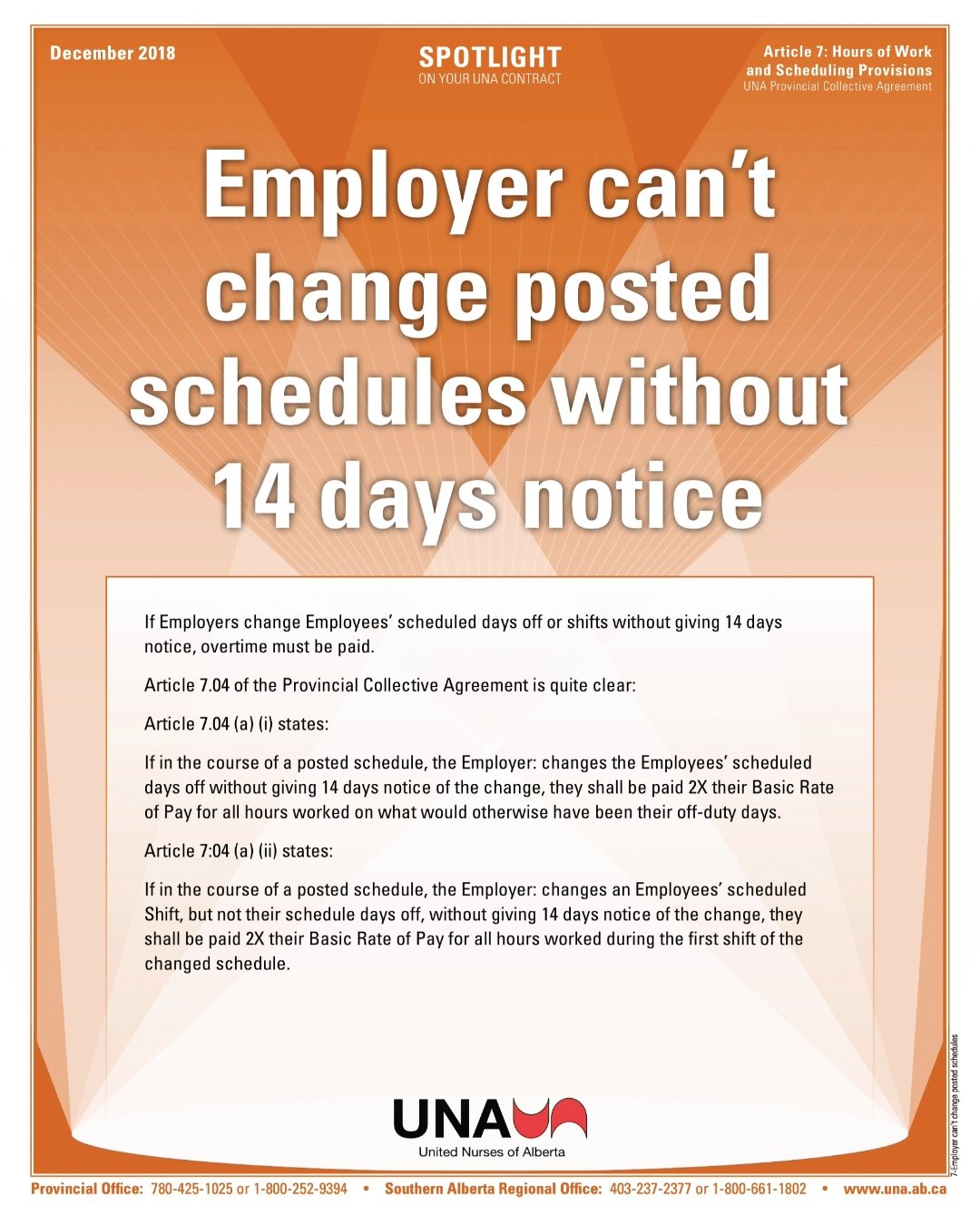
Employer can't change posted schedules without 14 days notice
Employer can't change posted schedules without 14 days' notice
If Employers change Employees’ scheduled days off or shifts without giving 14 days notice, overtime must be paid. Article 7.04 of the Provincial Collective Agreement is quite clear: Article 7.04 (a) (i) states: If in the course of a posted schedule, the Employer: changes the Employees’ scheduled days off without giving 14 days notice of the change, they shall be paid 2X their Basic Rate of Pay for all hours worked on what would otherwise have been their off-duty days. Article 7:04 (a) (ii) states: If in the course of a posted schedule, the Employer: changes an Employees’ scheduled Shift, but not their schedule days off, without giving 14 days notice of the change, they shall be paid 2X their Basic Rate of Pay for all hours worked during the first shift of the changed schedule.
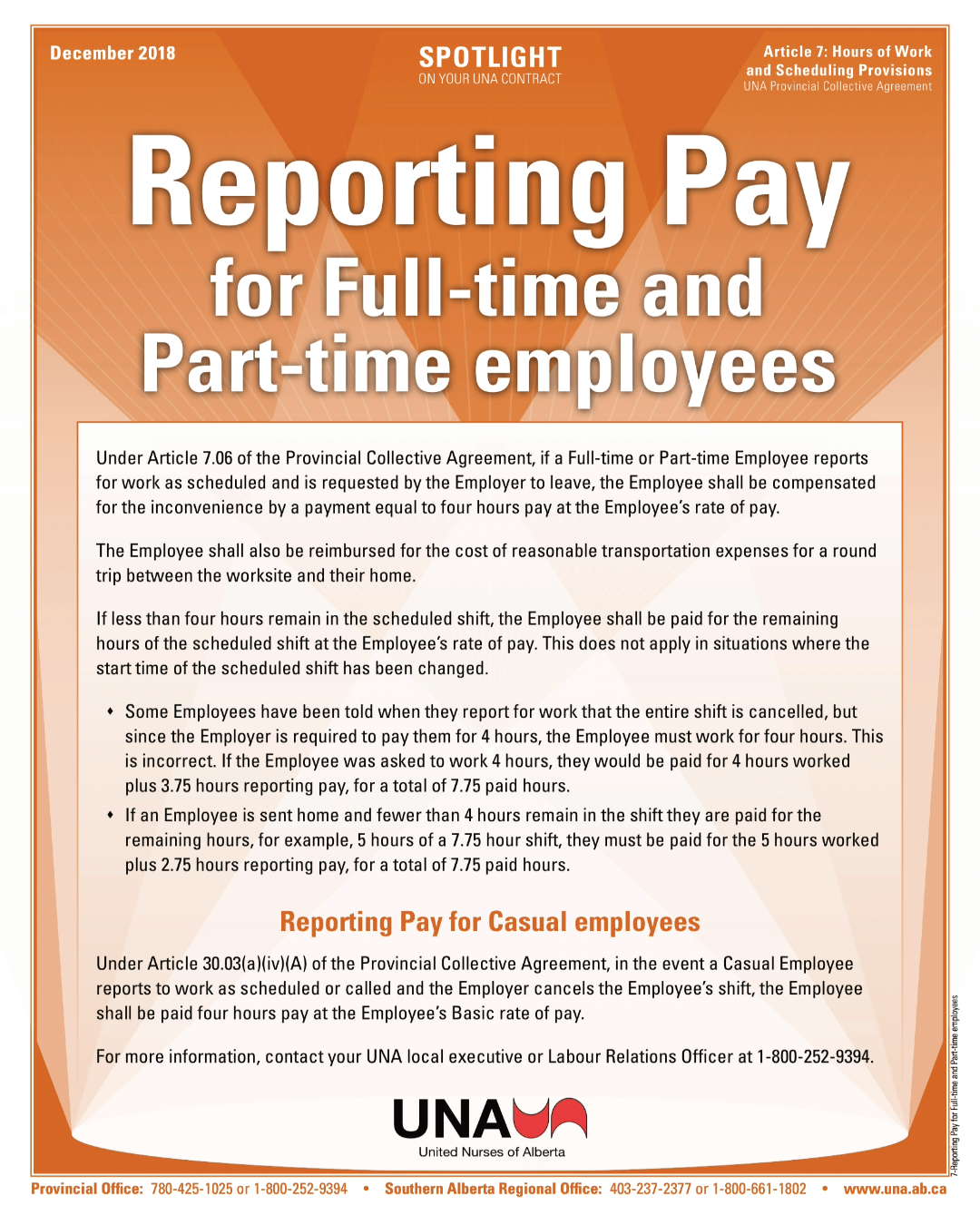
Reporting Pay for Full-time and Part-time employees
Reporting Pay for Full-time and Part-time employees
Under Article 7.06 of the Provincial Collective Agreement, if a Full-time or Part-time Employee reports for work as scheduled and is requested by the Employer to leave, the Employee shall be compensated for the inconvenience by a payment equal to four hours pay at the Employee’s rate of pay. The Employee shall also be reimbursed for the cost of reasonable transportation expenses for a round trip between the worksite and their home. If less than four hours remain in the scheduled shift, the Employee shall be paid for the remaining hours of the scheduled shift at the Employee’s rate of pay. This does not apply in situations where the start time of the scheduled shift has been changed. Some Employees have been told when they report for work that the entire shift is cancelled, but since the Employer is required to pay them for 4 hours, the Employee must work for four hours. This is incorrect. If the Employee was asked to work 4 hours, they would be paid for 4 hours worked plus 3.75 hours reporting pay, for a total of 7.75 paid hours. If an Employee is sent home and fewer than 4 hours remain in the shift they are paid for the remaining hours, for example, 5 hours of a 7.75 hour shift, they must be paid for the 5 hours worked plus 2.75 hours reporting pay, for a total of 7.75 paid hours. Reporting Pay for Casual employees Under Article 30.03(a)(iv)(A) of the Provincial Collective Agreement, in the event a Casual Employee reports to work as scheduled or called and the Employer cancels the Employee’s shift, the Employee shall be paid four hours pay at the Employee’s Basic rate of pay. For more information, contact your UNA local executive or Labour Relations Officer at 1-800-252-9394.

Employees assigned on-call duty must be paid for telephone consultations
Employees assigned on-call duty must be paid for telephone consultations
Employees who are assigned on-call duties must be paid for telephone consultations during the times they are on call. Article 9.01,On-Call, of the UNA Provincial Collective Agreement defines on-call duty as “any period during which an Employee is not on regular duty and during which the Employee is on-call and must be reasonably available to respond without undue delay to any request to report for duty.” Article 9.08, Telephone Consultation, says that “when an Employee, who has been assigned on-call duty, is consulted by telephone and is authorized to handle patient/resident/client matters without returning to the workplace, such Employee shall be paid the overtime rate for the total accumulated time spent on telephone consultation(s), and corresponding required documentation, during the on-call period.” In addition, Article 9.08 states that “if telephone consultation has been provided by the Employee and the total accumulated time spent on such telephone consultation(s) and corresponding required documentation, during the on-call period, is less than 30 minutes, the Employee shall be compensated at the overtime rate for 30 minutes.” For more information, or to address a problem being paid for telephone consultations during on-call periods, call your UNA local executive or Labour Relations Officer at 1-800-252-9394.
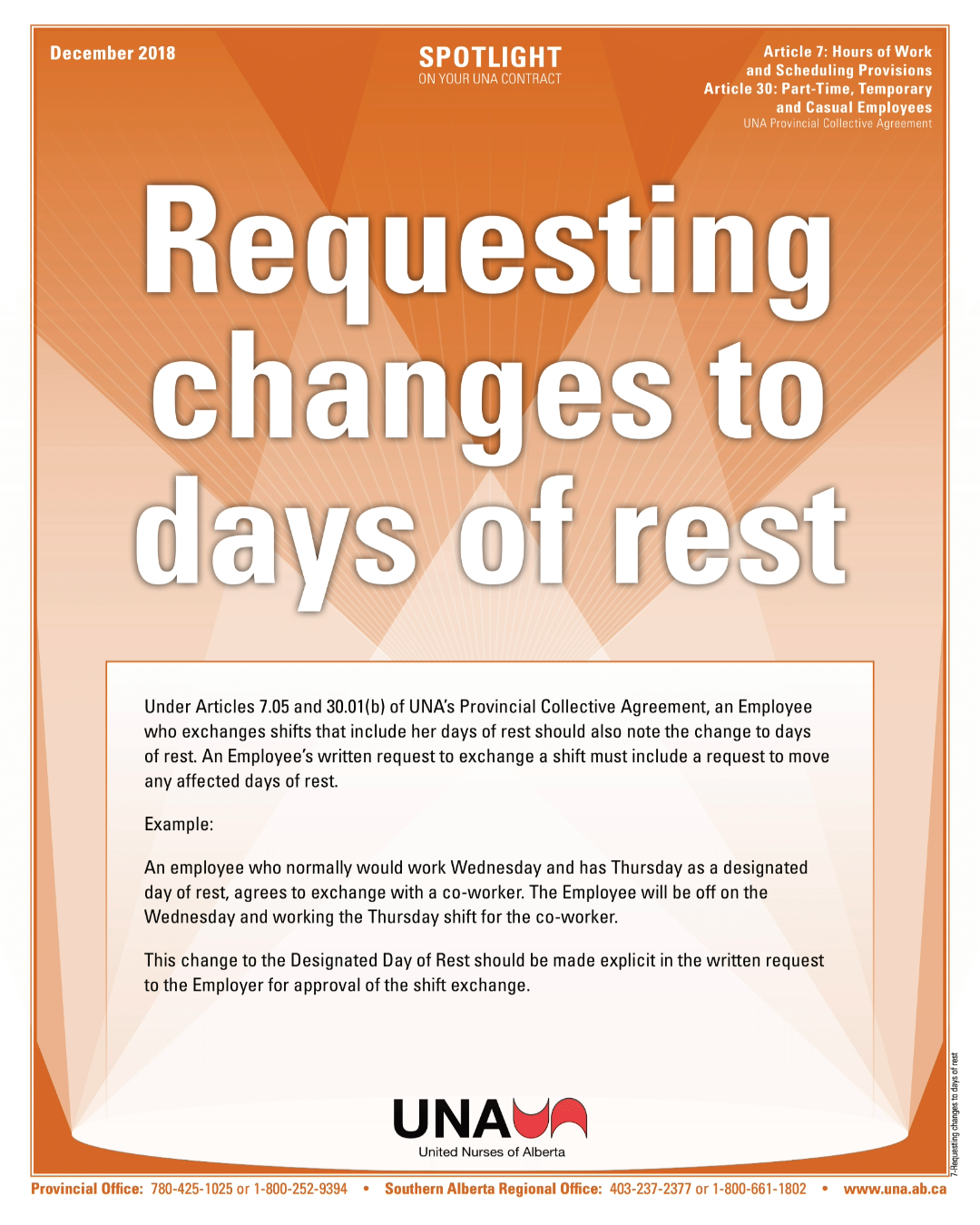
Requesting changes to days of rest
Requesting changes to days of rest
Under Articles 7.05 and 30.01(b) of UNA’s Provincial Collective Agreement, an Employee who exchanges shifts that include her days of rest should also note the change to days of rest. An Employee’s written request to exchange a shift must include a request to move any affected days of rest. Example: An employee who normally would work Wednesday and has Thursday as a designated day of rest, agrees to exchange with a co-worker. The Employee will be off on the Wednesday and working the Thursday shift for the co-worker. This change to the Designated Day of Rest should be made explicit in the written request to the Employer for approval of the shift exchange.
